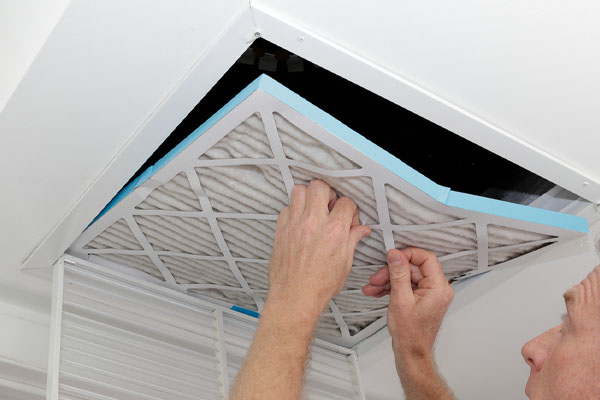
All homes contain a certain degree of pollutants. The naked eye is not able to see some of these unwanted air particles, but we can still feel their adverse effects on our lives. If you are concerned about your home’s indoor air quality, replace your air filters regularly. While some can follow the recommended schedule of the manufacturer, others may need to replace their air filter once a month. Therefore, the frequency of an air filter replacement truly depends on your home. Also, when buying new filters, you should check their MERV rating. This is also an important consideration to take where it concerns air quality and HVAC system performance. Read on to learn more about MERV ratings.
What Is A MERV Rating?
Air filter shopping can be confusing if you haven’t done it before. After all, many products will claim that they are the best ones to use. Doing some research will quickly tell you which ones don’t hit the mark. Understanding the specifications will help you understand what the numbers mean. For instance, “MERV” stands for the Minimum Efficiency Reporting Value. It is a crucial indicator of how many undesirable particles an air filter can catch. An air filter that has a higher MERV rating has better filtration capacity.
How Do MERV Ratings Work?

The MERV rating system ranges from 1 to 20. You would generally want to buy one that has a higher rating. However, a mid-ranged MERV rating is needed in some applications. For instance, demanding structures like nuclear power plants and hospitals need MERV 16 to 20 air filters. Most homes need filters that are usually rated from MERV 5 to 13. Using an air filter with a rating under MERV 5 will not be enough to ensure good air quality inside a home. Whereas, those with an above MERV 13 rating might compromise the residential HVAC system’s performance.
How Is MERV Rating Determined?
Filters go through rigorous tests to figure out their MERV rating. The process includes numerous particles in three various size ranges:
- E1 is 0.3 to 1.0 microns
- E2 is 1.0 to 3.0 microns
- E3 is 3.0 to 10 microns
The human eye cannot see these because we cannot discern anything smaller than 40 microns. As a comparison, human hair is around 50 microns in diameter. The good news is that they can be detected with sensitive laboratory equipment. These small particles are sprayed through the filters and counted. The worst test score is used for the MERV rating, as it measures the filter’s “minimum efficiency.” A filter must be able to catch 95% or more particles to be rated as a MERV 16 filter.
MERV & Your Indoor Air Quality
Indoor air quality massively affects your family’s comfort and health. Frequent allergic reactions among your family members can indicate that it is time to switch to a filter with a higher MERV score. This product can remove more air pollutants, so common allergy symptoms are reduced. The home’s occupants will have fewer complaints of sore throats, fatigue, eye irritation, headaches, rashes, runny nose, and persistent sneezing. Upgrading your filter also protects your home from damage caused by bacteria and dust. There will also be less bouts of illness, and you can avoid contagions. If a family member has a weak immune system, getting a filter with a high MERV rating can be extremely helpful.
Your Energy Use & MERV Ratings
Air filters require smaller holes to capture more particles in the air. It becomes a challenge for air to pass through as these holes shrink in size. The HVAC system will have to use more energy to function as intended. This is why it is not recommended for residential structures to use a MERV 20 filter as they aren’t built to handle this level of filtration. It will only result in increased energy bills and HVAC systems that might break down earlier than expected unless adjustments are made. Residential air filters usually range between MERV 8 and 13. These levels are adequate in maintaining decent air quality without a drastic increase in your energy bills. Consult your local, trusted HVAC contractor if you are unsure which type of HVAC filter works best for your home.
How Your HVAC Air Filter Impacts The Condition of Your HVAC System

All forced-air HVAC systems come with their recommended air filter MERV rating. Homeowners should use the recommended rating so that unwanted complications are prevented. Low-rated filters might be cheaper, but they can eventually result in expensive system problems. These filters have inadequate power to capture pollutants. Therefore, expect dust and bacteria accumulation in the ducts. Your system’s efficiency will also significantly drop while maintenance bills will increase. However, buying an air filter that’s rated more than the recommended score will quicken wear, shorten the system’s service life, and decrease airflow.
Should I Buy Filters With High MERV Ratings?
People often choose higher ratings when choosing hotels, and products, among others. Doing so generally results in better experiences, but it isn’t always true. After all, higher MERV ratings don’t always translate to better results. Highly-rated MERV filters can better capture pollen, pet hair, and bacteria. However, these also stop air from flowing at ideal speeds across the system. Poor air movement increases energy consumption and monthly bills while reducing indoor comfort. It is crucial that you match your system with the most compatible air filters.
What MERV Rating Should My Filter Have?
Each heating and cooling system is unique, so it can be a challenge to give exact recommendations. Refer to the owner’s manual on what will work best for your system. Most homes are compatible with MERV 8 to 13 filters. These can remove a majority of the unwanted particles without causing a strain on your system. You can get better results over time when all HVAC components work well together. A MERV 8 filter should be enough in a home with few occupants and no pets. More people and some pets mean that a MERV 11 is better. A MERV 13 filter is necessary to ensure the health and well-being of any occupants with a weak immune system.
Conclusion
It is crucial to consider the MERV rating when choosing the air filters to use in your system. It measures the product’s worst-case performance when sprayed with microscopic particles. You wouldn’t want low-rated filters because they are inadequate for air cleaning. However, high-rated ones aren’t necessarily ideal because they can negatively affect your system if they are incompatible. Most homes work well with mid-range filters or those ranging from MERV 8 to 13. The best filter to use depends on the situation in your home.
Call R.F. Ohl For All Of Your HVAC Requirements

R.F. Ohl provides high-quality HVAC services in the Poconos and the Lehigh Valley, Pennsylvania. We have the best professionally certified technicians who can conduct excellent heating and cooling repairs, tune-ups, installations, and replacements. Each of our friendly techs has the right tools, knowledge, and experience to service your HVAC system promptly and correctly.
Rest assured, our company has one of the most affordable HVAC services prices in the area. Our maintenance services can increase energy efficiency, improve comfort and indoor air quality while reducing your home’s energy costs. We can also recommend the best HVAC repair or replacement system while staying within your budget. We back all of our work with a guarantee. Book a service appointment with R.F. Ohl today. Call now and receive a free, in-home estimate.
Click here to contact us today or give us a call at (610) 377-1098 if you have any questions.
The post What Is A MERV Rating? appeared first on R.F. Ohl.
No comments:
Post a Comment